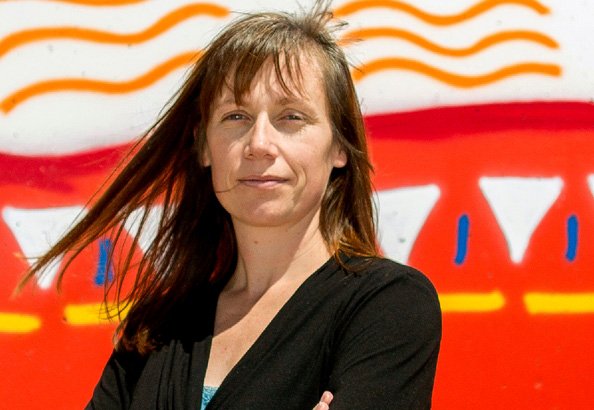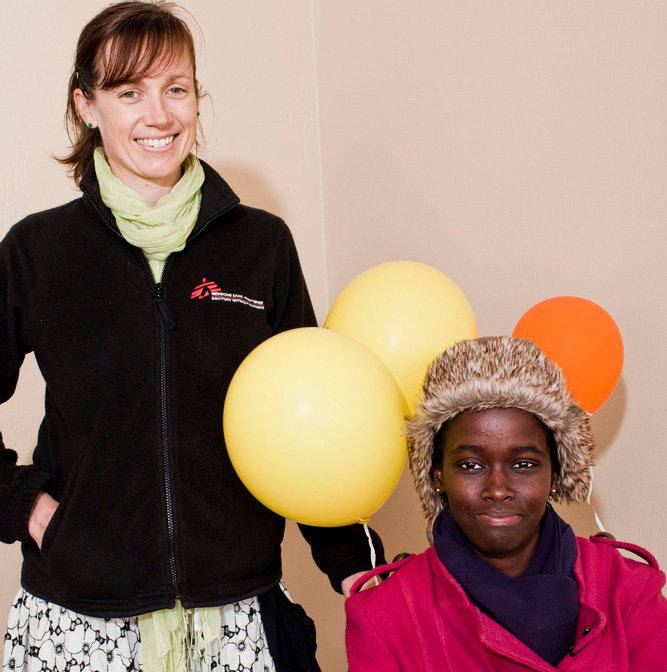Dr Jenny Hughes, MSF’s TB doctor, graduated from Cardiff University in Wales in 2005. A few years later, she moved to South Africa to gain experience in a different healthcare setting. This is where her passion for TB really began. Since 2010 she has worked in Khayelitsha, Western Cape, where MSF runs a strengthened regimen programme that incorporates new drugs into treatment regimens for DR-TB patients. Her patients include Nonyanyiso, Sinethemba and Simphiwe . She shares her story:

If you ask my best friend from medical school, she will say she always knew I would be a TB doctor. I studied in Wales, where we had a total of maybe three hours teaching on TB. But I was instantly fascinated.
I remember one of the first statistics I read about TB; a third of the world’s population is infected. I was blown away. I couldn’t believe how prevalent it is; how despite having made advances in so many other areas of medicine, this disease - which has been around for so long, which has treatment that is effective and which we can cure – is still a problem. And I think that’s what gripped me.
When I first came to South Africa, I worked in the rural Eastern Cape, in a ward filled with women who all had TB. I remember how incredibly thin they were, most dying of a disease that is curable. What struck me was that these were all young women - teenagers, some in their 20s and 30s, my age - and here they were on death’s door. They had their whole lives ahead of them but nobody was paying attention. Something wasn’t right to my mind; it just didn’t make any sense.
That’s where my real passion for TB began. I witnessed first-hand the devastating effects of it - and particularly DR-TB - on impoverished communities, which were being ravaged by a preventable and curable, yet largely neglected, infectious disease.
TB is not a sexy disease. But I got sucked in. I started paying attention and asking questions, and soon, people were sending TB patients to me. The more people I treated, or lost, or helped to cure, the more I learned. It all galvanised me to keep going.
I am passionate about getting better TB treatment for people, and accessing treatment for those who otherwise wouldn’t get it. I feel strongly about achieving equality in treatment. If I am diagnosed with DR-TB I would have access to bedaqueline, delamanid, linezolid - all these drugs - as easily as I want because I can afford to pay for it. But a person in Khayelitsha wouldn’t have it as easy, and that is unfair. Everyone should have access to effective drugs, especially when they have this life-threatening disease.

I have worked as MSF’s TB doctor in Khayelitsha since 2010. The township has some of the highest rates of TB and DR-TB in the country, and MSF supports treatment for specific patients in existing hospitals there.
What I love most about being a doctor is seeing my patients. On an average day, I can visit patients in up to 10 clinics. There is usually no space, so we squeeze into somebody’s hospital room, or sit outside with them and do an assessment.
The most prevalent feeling I have when I speak to them is humility. I feel humbled by their determination to just get through the tough treatment. Some people have grit, they just push through, especially the ones who have had every side effect known to man. But their trust in the treatment, and in us, motivates them.
There are sometimes difficult cases, and frustrating patients, like Simphiwe who was diagnosed with pre-XDR-TB, but disappeared from Khayelitsha for a few years just as he was meant to begin his treatment. That showed me that there is a limit to the amount we can do. As a doctor my patients are a priority, and their own health should be their highest priority. But sometimes it isn’t. Patients have to decide for themselves, and we just have to accept it.
The patients I treat have taught me that if you really want it you can push through and achieve it. But there is also the harsh reality: some patients with DR-TB will die, even if we do everything we can.
My daily 30km drive from Cape Town to my office in the middle of Khayelitsha is a humbling experience, a daily reminder of the harsh reality and severe difficulties that many face. And that’s even before patients have come to the clinic to hear me break the news that their persistent cough is actually an infection with a deadly disease that will in all likelihood kill or disable them.
The fact that any of our patients manage to make it through the seemingly insurmountable two year journey with the toxic treatment options we offer them is a miracle in itself, and my contrasting drive back home from work keeps reminding me of that.
Find out more about MSF's work in South Africa.